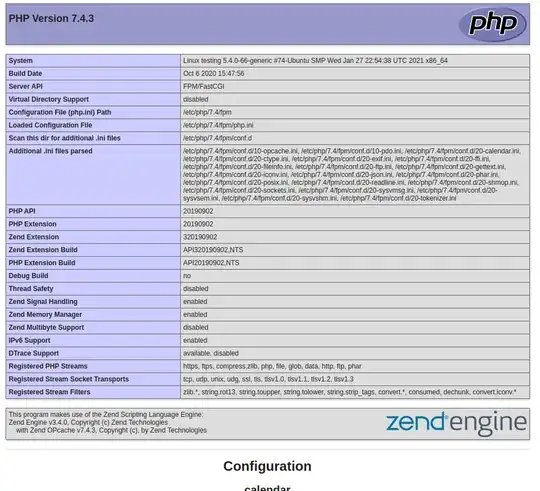I followed directions from here to switch the server API entry will be FPM/FastCGI.from Server API Apache 2.0 Handler. When mpm_event is enabled and a2dismod php7.4 the phpinfo.php shows only:
<?php phpinfo(); ?>
Apache status:
Apache Server Status for localhost (via 127.0.0.1)
Server Version: Apache/2.4.46 (Ubuntu) mod_fcgid/2.3.9 OpenSSL/1.1.1f
Server MPM: event
Server Built: 2020-11-13T01:36:38
----------------------------------------------------------------------
Current Time: Saturday, 27-Feb-2021 13:08:50 EST
Restart Time: Saturday, 27-Feb-2021 13:05:50 EST
Parent Server Config. Generation: 1
Parent Server MPM Generation: 0
Server uptime: 3 minutes
Server load: 0.80 0.95 1.07
Total accesses: 14 - Total Traffic: 190 kB - Total Duration: 10069
CPU Usage: u0 s.05 cu0 cs0 - .0278% CPU load
.0778 requests/sec - 1080 B/second - 13.6 kB/request - 719.214 ms/request
1 requests currently being processed, 49 idle workers
+------------------------------------------------------------------------+
| | | |Connections |Threads |Async connections |
|Slot|PID |Stopping|---------------+---------+--------------------------|
| | | |total|accepting|busy|idle|writing|keep-alive|closing|
|----+-----+--------+-----+---------+----+----+-------+----------+-------|
|0 |46738|no |0 |yes |1 |24 |0 |0 |0 |
|----+-----+--------+-----+---------+----+----+-------+----------+-------|
|1 |46739|no |0 |yes |0 |25 |0 |0 |0 |
|----+-----+--------+-----+---------+----+----+-------+----------+-------|
|Sum |2 |0 |0 | |1 |49 |0 |0 |0 |
+------------------------------------------------------------------------+
_______________W__________________________________..............
................................................................
......................
Scoreboard Key:
"_" Waiting for Connection, "S" Starting up, "R" Reading Request,
"W" Sending Reply, "K" Keepalive (read), "D" DNS Lookup,
"C" Closing connection, "L" Logging, "G" Gracefully finishing,
"I" Idle cleanup of worker, "." Open slot with no current process
If I enable php7.4 and switch back on mpm_prefork, it will restore to Apache 2.0 Handler. Is something not right what I am doing?
Latest note: it partially works, but PHP pages still not shown correctly.
The PHP pages are shown correctly now and the MySQL connection test works. After I entered a2enmod php7.4 which should have switched to Server API Apache 2.0 Handler get the error below but switched to FPM/FastCGI.
Besides is capture here for future references it was 3 nights of work: enable/disable modules, dependencies conflicts, updates, configurations and logging. Copy&Paste from other posts always sucks. Thanks!
SOLVED
a2enmod php7.4
Considering dependency mpm_prefork for php7.4:
Considering conflict mpm_event for mpm_prefork:
ERROR: Module mpm_event is enabled - cannot proceed due to conflicts. It needs to be disabled first!
Considering conflict mpm_worker for mpm_prefork:
ERROR: Could not enable dependency mpm_prefork for php7.4, aborting

